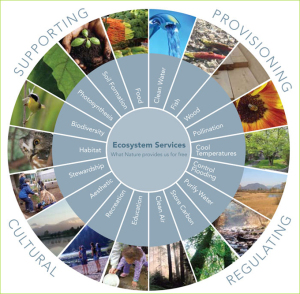Payments for Ecosystem Services. Know About It?


 Beleaguered Liberia (Ebola) will receive $150M in aid from Norway in exchange for Liberia’s cessation of clear-cutting its rain forest. Now that’s progressive! This negotiation is a payment for ecosystem services.
Beleaguered Liberia (Ebola) will receive $150M in aid from Norway in exchange for Liberia’s cessation of clear-cutting its rain forest. Now that’s progressive! This negotiation is a payment for ecosystem services.
Negotiations of this kind follow a rationale known as the Coase theorem, named after economist and Nobel laureate Ronald Coase. Originally argued by Coase in 1960, the idea is that parties can negotiate deals for economic allocation, including provisions for an “externality” such as the slowing of an economic act that’s deleterious to the environment.
Coase, as The New Yorker writer James Surowiecki explains, “suggested that, in the case of a problem like pollution, it doesn’t matter who the polluter is: the people who pay to stop it will be those who reap the biggest benefit from stopping it.” Give that a moment’s thought.
While nowhere near an expected funding level so far, the U.N. has set up and is operating the Green Climate Fund for “mitigation and adaptation” in the developing world. (I’d link the Green Climate Fund for you but I’ve found it hopelessly unappealing.)
From the Intergovernmental Panel on Climate Change, adaptation refers to “adjustments in ecological, social, or economic systems in response to actual or expected climatic stimuli and their effects or impacts. It refers to changes in processes, practices, and structures to moderate potential damages or to benefit from opportunities associated with climate change”. (For terse sentences like the last, I suggest lowering your speed reading limit enough for absorption and comprehension.)
In the main, the goal of the Green Climate Fund is to provide funding that enables developing nations to lessen their greenhouse gas emissions without constraining economic growth. It’s a form of ecosystem services.
Those making deals for ecosystem services hope to sustain global biodiversity, something made much more difficult by the destruction of natural habitat by human activity.

Here’s a fairly obscure example of ecosystem services paid for by private philanthropy. The lemur and other primates of Madagascar are an endangered species there, poached for bushmeat. A Florida-based non-profit has been in the business of transferring rescued lemurs from their threatened native habitat in Madagascar to a similar habitat in central Florida for captive breeding, scientific study and related educational pursuits in a reserve. The results of this ecosystem service helps sustain global biodiversity.
Can you think of other organizations involved in ecosystem services? Anybody out there providing farmers in the Chesapeake Bay Watershed with $$ to switch to less ecologically damaging methods of land production?